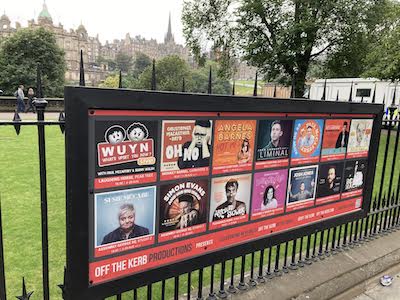This year’s Edinburgh Festival Fringe saw an estimated 2.2 million tickets sold for 3,334 shows which were performed by artists from 63 countries.
That’s down from the more than 3 million Fringe tickets sold in 2019.
EdFest.com, which represents eight of the biggest fringe venues — Assembly, Dance Base, Gilded Balloon, Just the Tonic, Pleasance, Summerhall, Underbelly and Zoo — forecast that the number of tickets they collectively sold will be down 25% compared to 2019.
EdFest.com said the biggest problem facing the Edinburgh Festival Fringe is the “soaring cost of accommodation in Edinburgh in August.”
It said audiences and artists “are being priced out of town, out of experiences.”
A spokesperson for EdFest.com said: “It has been fantastic to be back at the first full Fringe since 2019 – to see the live performance industry come roaring back to life in this post-pandemic world.
“There has been a real appetite and energy for shared, live experiences in Edinburgh over the last few weeks and the quality of the programme has been incredible – yet, the forecast number of tickets we’ve collectively sold is down 25% compared to 2019 which is a major threat for everyone involved in the festival.
“Together, we eight venues are forecast to have sold more than 1,486,746 tickets despite the very real continuing challenges to our industry, including the cost-of-living crisis, the lingering effects of coronavirus, the cost and uncertainty of international travel, the recent train strikes and more.
“Chief among these however is the soaring cost of accommodation in Edinburgh in August – audiences and artists alike are being priced out of town, out of experiences.
“It is clear to anyone spending time in Edinburgh, that there are fewer people in the city this year than in 2019.
“While there are certainly other factors that have affected audience numbers this year; the cost of accommodation is a perennial problem across the board.
“Disruption with public transport, delays with artist visas, and high fuel costs are even more insurmountable when people and performers simply cannot afford to stay in the city.
“We know that a lack of safe, affordable housing is not just an August problem, but one that affects the artists, staff and audiences who call Edinburgh home.
“It’s imperative that local and national government, landlords, the universities, Fringe venues and the Fringe Society all come together to find a lasting solution for this issue, or the future of the Fringe is in very real danger.
“Long term we also have to find solutions that allow the festival to be affordable to performers and the audience.
“Given the extent of the reduction in sales the overall festival has a major job to do in restoring the event to normality, which may take several years and require some public support.
“We need to stabilise the current situation where many people have made significant losses; to address the accommodation issue; to find ways of supporting work; and a major marketing campaign to get the audience back to the festival.
“Over the past 75 years, the Edinburgh Festival Fringe has earned its reputation as the world’s leading arts festival.
“We must continue to work together to do everything in our power to ensure that it remains a vibrant, inclusive, and financially accessible destination for another 75 years.”
Edinburgh Festival Fringe Society CEO Shona McCarthy said: “This year’s festival is the first step in what will be a long road to recovery and renewal.
“The hard work of thousands of artists, and hundreds of venues, producers and staff has combined to deliver the 75th anniversary festival during one of the most challenging summers on record.
“We recognise the significant amount of work that is still required to support the long-term sustainability of this phenomenal festival.
“As we review and discuss all the learnings from this year, our focus this autumn will be on planning for the 2023 Edinburgh Fringe …
“The eyes of the world look to this historic city every August, and we need to work together to ensure the Fringe is the best place for creatives to express their ideas, audiences to support them and for people across the sector to develop their skills and careers for the next 75 years.”
Edinburgh Festival Fringe Society chair Benny Higgins said: “Recovery takes time, and that is why in June we launched our future development goals.
“The Society acts to offer anyone a stage and everyone a seat, and there is much to do in the coming months.
“We need to ensure the Fringe is the best place for thriving artists, while ensuring fair work and good citizenship.
“Our digital experience will be key to delivering our climate action targets, and we need to do more to ensure who you are, and where you’re from, is not a barrier to attending or participating in the Fringe.”
